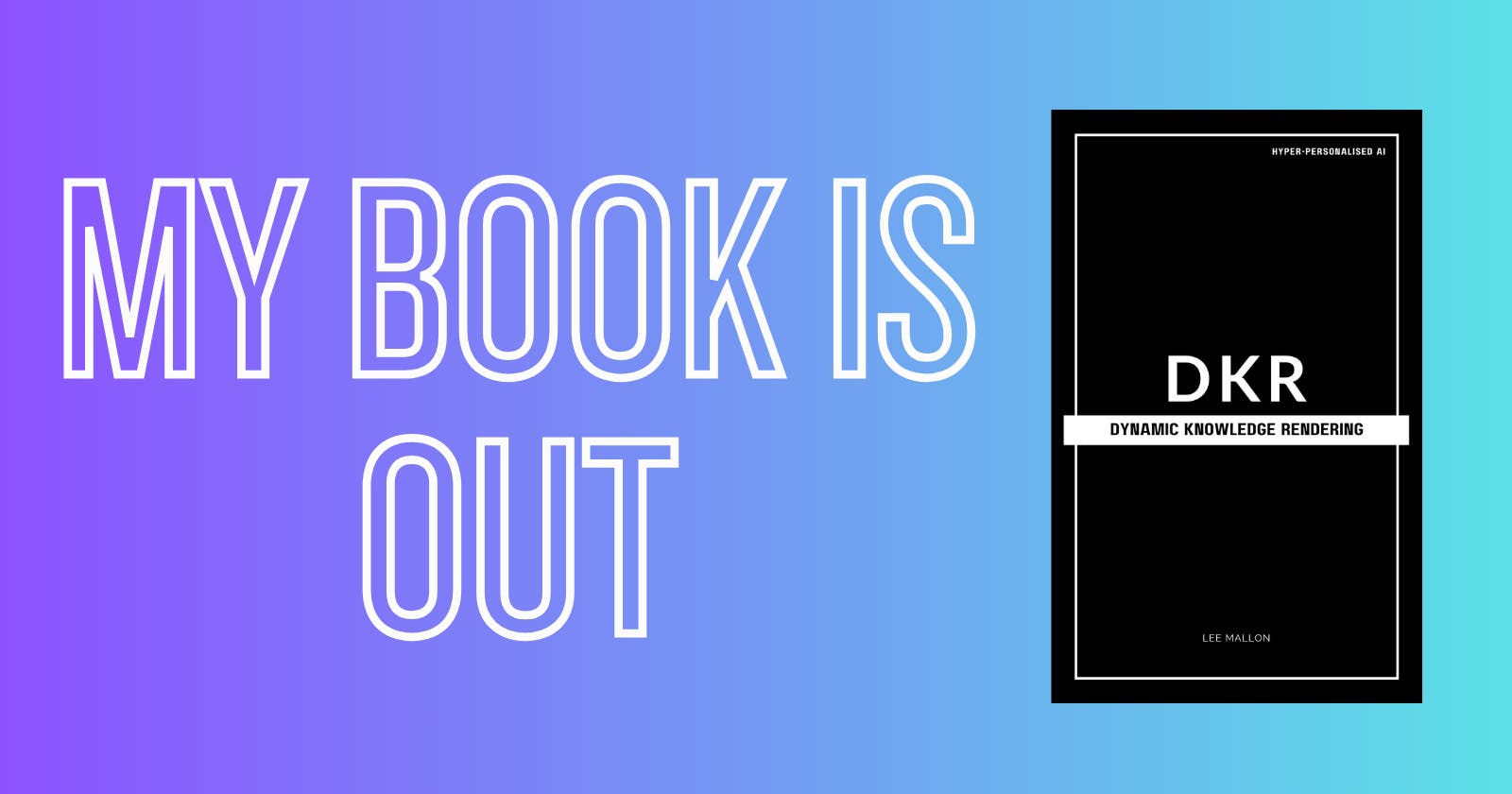After a decade of nurturing ideas and an intense six-month writing journey, DKR is finally here. This book embodies my exploration into the fascinating area of artificial intelligence, crafted for both AI enthusiasts and novices.
Why DKR (Dynamic Knowledge Rendering)? In a world rapidly transforming through AI, understanding the essence of knowledge, information, and wisdom becomes paramount. DKR delves into these core questions, presenting a future where AI tailors our digital experiences to our individual preferences.
1. What is Information and Knowledge in a world of AI?
2. How do we navigate this hyper-personalised world safely and ethically?
3. How do we ensure that AI serves our best interests?
4. What is the global impact of all of this?
Get Your Copy: DKR is available on Amazon, Kindle, and for those keen on diving in immediately, a digital complimentary copy can be accessed here.
An extract from DKR
It is a warm summer's day, the clock reads 2:43pm, and I am sitting in a hotel lobby in Dubai, UAE.
The scene before me is a microcosm of society; I currently see 37 adults, nine teenagers, three children, and a baby. Among the 46 adults and teens, 31 are women, and 14 are men (I can’t tell the baby’s gender). The crowd is a mixture: families checking in for a weekend getaway, couples embarking on their summer holiday, and business professionals adorned in suits, dresses and traditional Middle Eastern attire. Six of these 46 individuals are either asleep or dozing on sofas. Among the remaining 40, one cradles a baby while three are at the check-in counters. That leaves 37 individuals, 32 engrossed in their mobile phones. I would make it 33 people on their phones if I were not jotting these observations down on pen and paper.
There are two men wearing IT conference swag t-shirts and holding their IBM Thinkpad laptops. I can just make out the GitHub and Databricks stickers on the outside cover of their laptops. One of the three people standing at the check-in counters is a lady in her 30s entering her credit card pin code into the reader; I unintentionally can make out 3 of the four digits. A bellboy is pushing a trolley of suitcases out of the lobby towards the car park; one bag is slightly leaning out of the trolley, and if he doesn’t make this corner, will it fall? He makes it, but only just, phew.
Whenever I venture out for dinner, I make it a point to sit facing the entrance. Rather than reading books, I prefer to listen to them. Indeed, much of this book has been dictated rather than written, as the writing process is significantly slower for me - nearly ten times as long - and I quickly lose interest.
So why share this story and information? The way I see the world is unique to me; I can imagine many people reading this are thinking, how do you record all those people in the hotel lobby, whilst others will have a pencil in the book margins making sure the numbers of people I described add up.
The habit of facing the entrance could stem from a deep-seated need for awareness of my surroundings. This trait influences my preference for auditory over visual learning methods. Dictating this book instead of writing it manually speaks to a broader theme of adapting processes to suit one's strengths and weaknesses. My tendency to get distracted, even by the most minor triggers, highlights the challenges of maintaining focus in an ever-connected and bustling world. Writing this paragraph has taken me eight attempts due to interruptions from notifications, distant voices outside, or even fleeting thoughts, such as pondering why oranges are both orange in colour and named 'oranges'. Didn’t Eminem say orange is an annoying word that doesn't rhyme?
I share this story because it provides a powerful reminder of the critical importance of recognising and adapting to our distinct cognitive landscapes, mainly how we absorb and process information. Our individuality means we each have a unique approach to learning, with what might be a swift route for one person potentially representing a more time-consuming and effort-intensive path for another. For instance, I might need help to thoroughly digest a 40-page report, retaining only about 20% of its content after a slow and laborious reading. However, if that same information was transformed into a movie or a series of slides accompanied by a voiceover - preferably one that mirrors the captivating tone of Morgan Freeman - my ability to absorb and recall the information dramatically improves. Suddenly, I can retain 80% of the content with 10 minutes of focused attention. Still, considerable effort is required to create this Morgan Freeman voiceover slide presentation movie. That effort previously would have outweighed the hyper-personalised benefit.
I am describing nothing new; many disciplines delve into learning styles and cognitive processes, ranging from psychology to pedagogy. Educational theorists have identified various learning styles, such as visual, auditory, kinesthetic-tactile and reading/writing. Though even with all these disciplines of learning and cognitive processes, we have for generations embraced a one-size-fits-all approach to education and knowledge transfer, primarily due to logistical constraints and established traditions, but that has bled out into the systems and services we use daily and created a rigid experience for interaction that aims for the median.
We are now at a tipping point, courtesy of advancements in technology and, more specifically, artificial intelligence, because knowledge absorption can now be hyper-personalised to you; I call this "Dynamic Knowledge Rendering".
Get Your Copy: DKR is available on Amazon, Kindle, and for those keen on diving in immediately, a digital complimentary copy can be accessed here.

